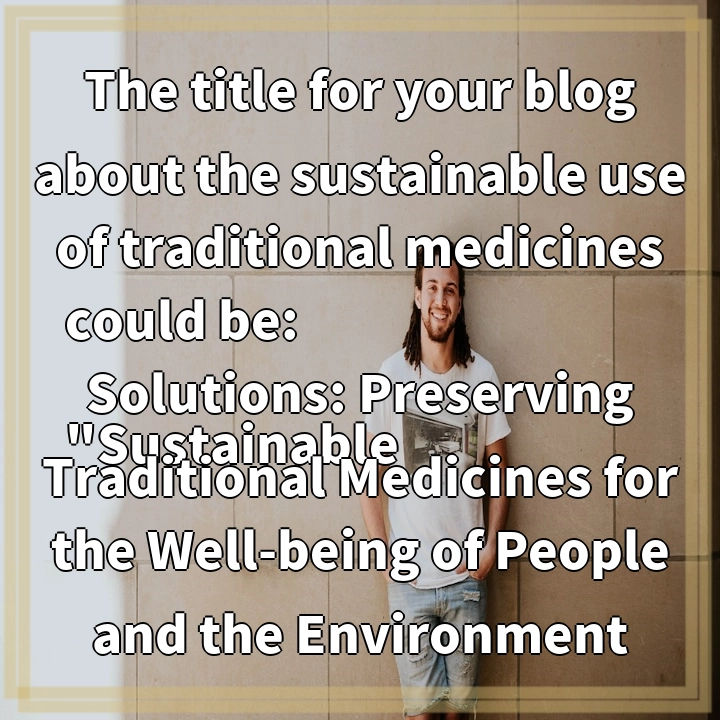
What it is:
Traditional medicines have been used by cultures all over the world for centuries, providing remedies for various health conditions and promoting well-being. These medicines are often derived from natural sources such as plants, animals, and minerals, and have been passed down through generations.
However, the sustainable use of traditional medicines involves carefully managing these resources to ensure their availability for future generations. It requires balancing the need for medicinal ingredients with the conservation of plant and animal species, protecting ecosystems, and respecting the cultural and traditional knowledge systems that guide their use.
By following sustainable practices, traditional medicines can continue to benefit people’s health and contribute to the overall well-being of individuals and communities.
Real-World Problems:
While traditional medicines have significant benefits, there are several real-world problems associated with their sustainable use:
Overharvesting:
One of the primary concerns is overharvesting of medicinal plants and animals. High demand, illegal harvesting practices, and habitat destruction can lead to the depletion of these valuable resources. Overharvesting not only threatens the survival of species but also disrupts the balance of ecosystems.
Lack of Regulation:
In many regions, there is a lack of adequate regulations and policies governing the sustainable use of traditional medicines. This can result in uncontrolled harvesting, unsustainable trade practices, and the loss of valuable resources. Implementing and enforcing regulations is crucial for protecting biodiversity and ensuring the long-term availability of traditional medicines.
Cultural Appropriation:
Traditional medicines are deeply rooted in cultural and traditional knowledge systems. However, in some instances, the commercialization and appropriation of traditional medicines can exploit indigenous communities and undermine their rights, intellectual property, and cultural heritage. Respecting and honoring the cultural origins of traditional medicines is essential for their sustainable use.
Climate Change:
Climate change poses further challenges to the sustainable use of traditional medicines. It alters ecosystems, affects the distribution of plant and animal species, and disrupts traditional harvesting seasons. Adapting traditional medicine practices to a changing climate and ensuring the resilience of medicinal resources is vital for their long-term sustainability.
Loss of Traditional Knowledge:
As modern medicine becomes more dominant, traditional knowledge about medicinal plants and practices is at risk of being lost. The passing down of this knowledge from generation to generation is essential for the continued use and sustainability of traditional medicines. Efforts to document and preserve traditional knowledge are crucial.
By addressing these real-world problems and promoting sustainable practices, we can ensure the preservation and continued use of traditional medicines for the well-being of both people and the environment.

Solutions for Sustainable Use of Traditional Medicines:
Addressing the real-world problems associated with the sustainable use of traditional medicines requires proactive efforts and collaboration. Here are some solutions to promote sustainability:
1. Conservation and Responsible Harvesting:
Implementing conservation strategies and responsible harvesting practices can help protect medicinal plant and animal species. This includes promoting sustainable cultivation, establishing protected areas, and monitoring the trade and collection of medicinal resources.
2. Regulation and Policy Frameworks:
Developing and enforcing regulations and policy frameworks is crucial to ensure sustainable practices in the traditional medicine industry. This includes setting harvesting quotas, promoting sustainable trade practices, and protecting the rights of indigenous communities and their traditional knowledge.
3. Community Engagement and Empowerment:
Engaging and empowering local communities and indigenous groups who hold traditional knowledge is vital. Involving them in decision-making processes, supporting their initiatives for sustainable resource management, and providing avenues for fair trade can help ensure the long-term preservation of traditional medicines.
4. Education and Awareness:
Raising awareness about the value of traditional medicines and their sustainable use is essential. Education programs can focus on promoting responsible consumption, highlighting the cultural and ecological significance of traditional medicines, and encouraging the integration of traditional knowledge with modern scientific research.
5. Research and Innovation:
Investing in research and innovation can contribute to the sustainable use of traditional medicines. This includes studying medicinal plant cultivation techniques, exploring alternative sources for medicinal ingredients, and identifying new ways to integrate traditional and modern healthcare practices.
6. Climate Change Adaptation:
Adapting traditional medicine practices to the impacts of climate change is necessary for their sustainability. This involves understanding how changing environments affect medicinal resources, supporting community resilience, and promoting the sustainable use of climate-resilient species.
By implementing these solutions, we can ensure the sustainable use of traditional medicines, preserving their benefits for future generations while safeguarding biodiversity and cultural heritage.















